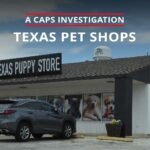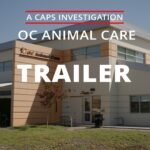
I’m Pete, CAPS’ lead investigator and author of Rescue Dogs. My 18 years of experience working for CAPS includes investigating hundreds of puppy and kitten mills and pet shops across the country and working undercover at the then largest USDA-licensed puppy brokerage facility, at an atrocious large-scale USDA-licensed broker/breeder, and at a Petland franchise. Recently, I went undercover to five pet shops in Pinellas County, Florida.
Pinellas County commissioners are leaning toward passing an ordinance that would ban the retail sale of dogs and cats but grandfather in six existing pet shops that sell puppies and kittens. Grandfathering in pet shops doesn’t work, as neighboring Hillsborough County, which recently undid its grandfather clause, discovered. The complete ban of the sale of dogs, cats and rabbits at all pet shops in a city, county or state accomplishes the following objectives: saves the lives of local shelter animals because more people adopt, protects consumers from fraud and deceit by pet shops, and diminishes the demand for mill-bred animals.
In August 2021, I went undercover to four pet shops — Blue Sky Puppies opened in mid-September; Sunshine Puppies opened a second location in December — selling puppies and kittens and one selling rabbits, guinea pigs, birds, chicks and ducklings. My goal was to investigate employee and owner claims about the source of the stores’ animals. Pet shops’ lies work on most people, because if you don’t have a deep understanding of commercial animal breeders, you won’t know how to question or research the information you’re provided at stores. Fortunately, CAPS does that for you. Here’s what we found.
The four stores all lied to me about the sources of their animals. Some of the lies were shockingly bold. The rabbit store employees admitted knowing nothing about their rabbit breeders, other than the breeders are locals and one is named “Harry.”
Petland Largo

Petland Largo makes a bizarre fraudulent claim to customers. An employee told me the store’s puppies come from the “top two percent of USDA-licensed and inspected breeders,” which he said ranks breeders on “health standards.” The USDA has no ranking system for breeders of any kind. Another employee told me the store’s breeding dogs all have access to yards, and showed me pictures of dogs playing in grass to demonstrate how kennels looked.

She said that older dogs are bred only two to three times in their lives, aren’t bred until they are two years old, and are only bred once a year. She also claimed smaller dogs are bred only once or twice, and French and English Bulldogs are bred only once in their lives. All of these statements are false. Few commercial breeders have yards for dogs, none have constant access to play yards for dogs, and I’ve never seen a breeder who breeds dogs as seldom as the employee claimed. Breeders breed female dogs as soon as they go into heat, and they typically go into heat at least twice in 18 months. Dogs are bred for many years, and no commercial breeder allows dogs that produce puppies to stop breeding after one litter of puppies.
John Stolzfus, a breeder who has sold to Levi Graber, talking about how often he breeds his female dogs
Puppies St. Pete

An employee at Puppies St Pete deserves an award for how confidently he lied. He claimed the USDA has a point scoring list for breeders. It does not. He claimed the USDA won’t allow dogs to be bred more than three times. The USDA doesn’t regulate how often dogs are bred.

He claimed the USDA has breeders skip dogs’ first heat cycle. They don’t. I asked about USDA-licensed breeders getting violations on inspections, and the employee said, “If they get any violations, they get their license revoked and they can’t apply for another one for three years.” This is completely false. There are thousands of examples of breeders having violations and continuing to have licenses.

Craig Gray, who had more than 700 dogs, was charged with 16 counts of aggravated animal cruelty in March 2019. He did not have a USDA license yet sold to Puppy Town in Sarasota and Tampa (renamed Puppies Tampa), which were owned by Michael Lamprea, the owner of Puppies St. Pete. Gray was arrested again a year later in Florida after failing to show up in court.
Sunshine Puppies

Sunshine Puppies claimed that breeders have teams of employees. They do not. Of the hundreds of USDA-licensed mills I’ve investigated, the vast majority have no employees at all. Typically, the family owning the puppy mill works it, and only brokers or particularly large breeders hire employees.
Sunshine Puppies buys most of its dogs from Pinnacle Pet (Sobrad, LLC) in Neosho, MO (USDA license # 43-B-3750), a broker that obtains puppies from mills to resell to pet shops. Subsequent to my investigation of Sunshine Puppies, I investigated three breeders who sell to Pinnacle Pet. All of these facilities are puppy mills.
Sandy Wisdom, Adair, OK, 73-A-2733
Gordon Everett, Moline, KS, 48-A-2225
Ruby Shown, Antlers, OK, 73-A-2423

Kasey Herod in Texas sells to Sunshine Puppies, mostly likely through Pinnacle Pet. A satellite image of this property show four large Sundowner type dog breeding buildings and another large building at the rear. This indicates that the Herods have many dogs but do NOT have either a USDA or Texas license.
Subsequent to our complaint to USDA, Kasey Herod obtained a license, 74-A-1568, under the name CH Ventures. She had 127 adults, 60 puppies at her 11/15/21 pre-license inspection (this is a large number of dogs at a pre-license inspection, which indicates she was selling without one). At her 2/16/22 inspection she had 156 adults, 61 puppies. She still does not have a USDA license.
An employee at Sunshine Puppies claimed Bulldogs are only bred one or two times. This is also false, as no commercial breeder will allow a producing dog to be bred once or twice and then stop.

All About Puppies

All About Puppies told me that most breeders keep their dogs in their houses and are not “mass-producin.” The employee showed me pictures of dogs in grassy yards to demonstrate breeding conditions. These statements and images are false. USDA-licensed breeders keep dogs in kennels, and I’ve never seen one with dogs with constant access to grassy yards. Most facilities don’t have play yards at all, and instead keep dogs solely in pens and cages. They are indeed mass-producing puppies, since USDA licenses are given to breeders for the purpose of routinely selling puppies for resale as a business.

Broker/breeder Lorilee Thomas in Kansas, who sells to All About Puppies, had 679 dogs and 379 puppies at 10/18/19 USDA inspection (most recent listed).
At each of the four puppy stores, I asked for information on a puppy’s breeder. When I asked for USDA inspection reports on a breeder at Sunshine Puppies, the employee showed me a puppy’s vet exam. All About Puppies did show me USDA inspection reports upon request but had incomplete breeder information on puppies’ cages.
At Petland Largo, I was given only a name, town, and state of a breeder, but no USDA license number. At Puppies St Pete I asked for USDA inspection reports on a breeder, and instead I was shown a puppy’s pedigree.
Most lies told by Pinellas County puppy stores don’t require individual examples to disprove. They are simply total fabrications. The stores make up government policies that don’t exist, and most wouldn’t offer information I asked for to verify their claims about breeders. Animal House Pet Center didn’t lie to me, but it’s concerning the employees have virtually no information to provide customers about where their rabbits come from. It’s also concerning that small mammals and birds, including baby chicks and ducklings, were in enclosures for people to touch while the sources they come from were unavailable to customers.
With fraud and deception by pet store employees being so brazen, how will customers know what to believe? Most pet shop customers don’t know how to research the USDA’s regulations, or even that the USDA inspects breeders at all. Most people have never been to a commercial dog breeder or even know what one looks like. Stopping the retail sale of puppies, kittens, and rabbits from stores protects animals that are abused and neglected by commercial breeders. Animals bred for profit can’t protect themselves; pet store customers have no way to avoid being misled. Banning the retail sale of puppies, kittens, and rabbits protects animals and customers and will increase local shelter adoptions, thereby saving lives.




